Home / Newsletters / ITN 68 / Subscribe
A Conversation That Can Save Lives: Family Conversations And Its Influence On Organ Donation
Siri Gurram, Nived Devadas, Radhi Singhania, Rishika Kedia, Jitendra S Rajput
Indian Transplant Newsletter. 2023 Apr-Jun; 22(1):p14-15
Print ISSN 0972 - 1568
Online ISSN 3048 - 653X
PDF
Siri Gurram, Nived Devadas, Ridhi Singhania, Rishika Kedia
Faculty Guide: Jitendra S Rajput
Strategic Design Management, Master of Design
National Institute of Design, Gandhinagar
India has made commendable progress in organ transplantation, experiencing a 27% annual increase in 1 transplant numbers. However, this achievement continues to be overshadowed by the prevalence of live organ donations, which necessitate life-altering procedures for healthy individuals who decide to donate. A crucial factor contributing to this disparity is the final decision-making authority resting with the family of a potential donor in case of deceased organ donations, regardless of whether the individual had previously pledged to donate. During times of grief, the concept of organ donation presents an unexpected challenge and adds a layer of pressure on decision-making. This emotional burden can potentially lead to a rejection of donation, especially when the topic has never been addressed within the family.
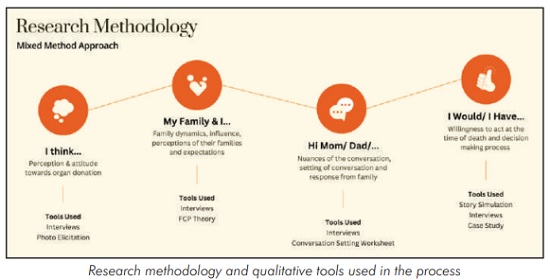
According to a study by Siminoff et al. (2001), prior knowledge of a patient's wishes significantly ties to the family's willingness to donate and families who have more conversations about organ donation are 2 more likely to donate. However, the stark reality is that a significant number of families avoid discussions about organ donation, and likewise, many registered donors fail to communicate their intentions to their loved ones, leading to organs going unutilized when the opportunity arises.
This research conducted by the students from the National Institute of Design, Gandhinagar as part of their Design Project, aims to study the influence of family in the process and how family conversations and dynamics shape the decisions regarding organ donation.
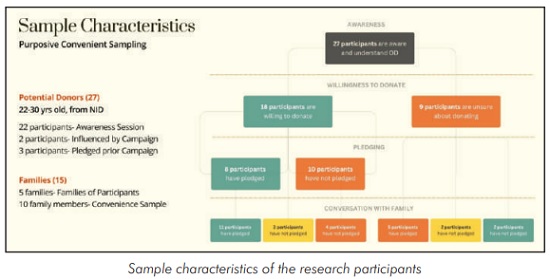
Please note that some limitations of the study include the sample being limited to students from the National Institute of Design, Gandhinagar and their families, which is not an accurate representation of the entire population of the country. The time constraint of 6 weeks prevented the study from examining real-life scenarios with respect to the conversion of pledges. A few participants were reluctant to share openly due to the topic's sensitive nature.
The key outcomes that emerged from the study are – Individuals who were exposed to the concept of organ donation through examples in their community or had family members who set a precedent of giving back to society were more inclined to make pledges or engage in conversations with their families.
The research also revealed a disconnect with the term "organ donation" itself. The word "organ" carries a scientific connotation, emphasizing the procedural aspects and potentially overshadowing the emotional experience of the families involved. Conversely, "donation" typically implies a charitable act arising from a sense of abundance and satisfaction. However, in the context of organ donation, families endure profound personal loss, resulting in a deep association with death rather than life. As a result, the notion of a "celebration of life" is not well-received in cases of untimely death. Hence, there is a need to reconsider the terminology.
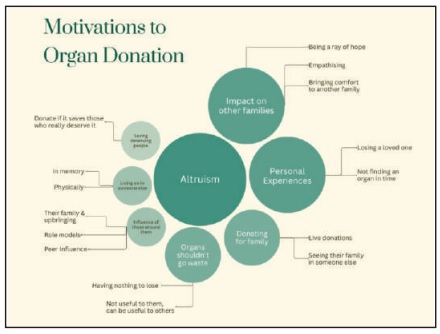
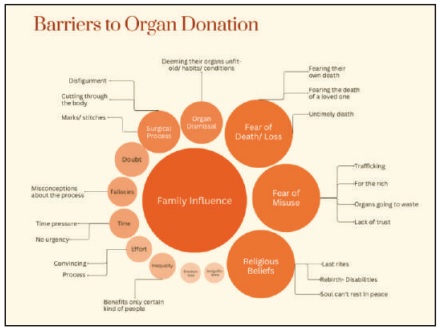
India being a collectivist society, individuals have a strong sense of ownership and attachment towards their family, including their bodies. There is an inclination to conform to their family's norms, both overt and underlying, leading individuals to consider their family's thoughts and opinions before making any decisions. Moreover, individuals believe that organ donation after their death would affect their family rather than themselves, granting them a sense of authority in the decision-making process. However, despite their stance on organ donation, many participants were reluctant to influence their family members' decisions, as they believed it should be an intrinsically motivated choice.
Individuals expressed a strong preference for having direct conversations with their family members to determine their stance on organ donation. Trusting these personal discussions more than pledges or information from social workers, a clear yes or no from family members translates to an acceptance or rejection to donate respectively. In the absence of such conversations, ambiguity arises, and individual perceptions and inclinations become influential.
Most organizations are prioritizing getting more pledges, overlooking the ineffective conversions of those pledges. Most pledgers fail to engage in meaningful conversations with their families, and even those who do, merely inform them without adequately preparing them. Individuals need to discuss topics such as brain death, its appearance, whom to contact in case of donation, the donation process, addressing beliefs and dispelling myths to significantly increase the likelihood of a successful donation.
Some immediate actionable steps that can be taken to tackle the challenges at hand include:
- Enhancing awareness campaigns: Communicate that pledges are not legally binding. Emphasize the family's role in donation decisions and the need to have a conversation immediately.
- Providing conversation guides and resources: Offer conversation guides providing necessary information, movies or series that facilitate organ donation discussions, and dispel myths. These resources help potential donors initiate conversations and prepare the family in a comfortable and informed manner.
- Healthcare facilities as a touchpoint: Instead of limiting organ donation information to posters outside the ICU, distribute visual infographics at touchpoints such as waiting areas and reception desks. This exposure stimulates conversations and increases awareness.
- Tailoring messages to individual contexts: There is no one-size-fits-all approach. Curate messaging to align with people's cultural, mental, emotional, and family contexts. Assure families that the donation process will be tailored to their circumstances, fostering comfort and ease.
- Reimagine the pledge process: Innovative ways to make it more interactive, effective, and engaging. This could involve incorporating technology, interactive elements, or alternative media to capture the commitment of potential donors.
While public campaigns have succeeded in raising general awareness, the next step should be to make organ donation a household conversation. Through these conversations, the gap between intention and action can be bridged, empowering families to honour the wishes of their loved ones and ultimately save more lives.
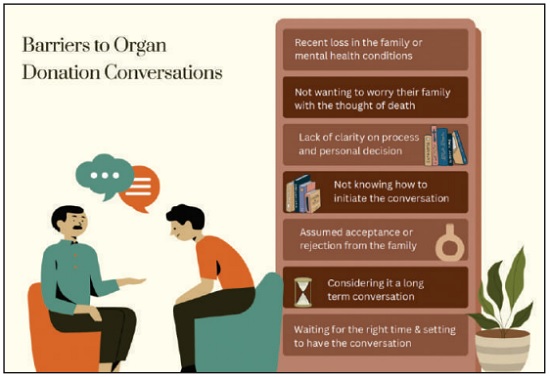
Editor’s note: The family Donor Card, championed by MOHAN Foundation, serves as a distinctive tool to advocate for organ donation in India and helps overcome the challenge of family conversations.
Available at:
https://www.itnnews.co.in/indian-transplant-newsletter/issue68/A-Conversation-That-Can-Save-Lives-Family-Conversations-And-Its-Influence-On-Organ-Donation-1241.htm
- Copyright © 2025. Published by MOHAN Foundation
